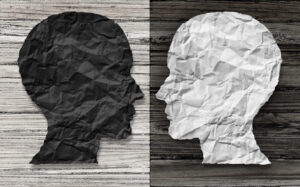Life-changing telepsychiatry services for BIPOLAR DISORDER
Break free from bipolar disorders with an evidence-based treatment plan tailored to you.
How we can help you conquer bipolar disorder
Our approach to anxiety care for patients begins with empathy and a deep understanding of how your condition impacts your quality of life. This allows us to come up with a treatment plan that revolves around your unique needs, medical history and the latest data out there. Here’s a breakdown:

60-Minute Psychiatric Assessment
Our approach to bipolar disorder care begins with empathy and a deep understanding of how mood fluctuations impact your daily life. We recognize that no two individuals experience bipolar disorder in the same way, which is why we develop a personalized treatment plan tailored to your unique needs, medical history, and the latest advancements in mental health care.

Evidence-Based Treatment
Our psychiatrists stay up to date with the latest research and treatments in mental health. Whether it’s therapy, medication, or a combination of both, we only recommend solutions backed by science to give you the best chance at success.
Success Stories
What Our Patients Are Saying
"When I started to have anxiety issues and my doctor couldn't help, I began searching for somebody who could. In calling around, I couldn't get in with anyone for several weeks. I then called Platinum Psychiatry and spoke with Mel. She was kind and compassionate and went out of her way to help me book an appointment for the very next morning. Platinum Psychiatry was very helpful and I would recommend them."
"My initial visit with Dr. Shorten went very well. I was comfortable with discussing my problems and with his responses. I felt "equal." He seemed understanding of my choices and thoughts, which means a great deal to me. I'm looking forward to my next visit! I've been seeing psychiatrists for nearly ten years, and it is rare for me to look forward to seeing a new one. Decent prices without insurance."
"Very professional, compassionate, and genuinely concerned about you as a patient and not your pocket case. I came to Dr Shorten feeling like a wreck but he listened, listened, and listened again. He has both me and my teenage son on track to feeling more like our usual selves."
"I searched for a Dr. for my boyfriend to meet with for weeks knowing that my boyfriend was reluctant to go. I was most concerned that the experience might not go well and my boyfriend wouldn’t give it another shot. Boy am I glad we went here. Dr. Shorten was AMAZING and not only made us feel comfortable but nailed it across the board with listening and helping my boyfriend to understand what’s going on. Do yourself the favor and schedule. You will not be disappointed."
"A brilliant, patient-focused psychiatric practice. As another reviewer had mentioned, their customer service is impeccable. The doctor himself is VERY skilled in bedside manner, and hearing the patient out. He answers your questions thoroughly, and you feel as though he cares about how well you're doing. He has helped me to achieve better results than any practitioner I'd encountered before him. Truly a Platinum-level practice!"
"I have been a patient for several months. Easy to get refills, is one of the few doctors who actually listened to what my goals were, and what medication I wanted to stay away from. Highly recommend. He is open to both Western and Eastern medicine and is very thoughtful and understanding. Genuinely cares about his patients."
LEARN More About Bipolar Disorder
Bipolar disorder is a mental health condition characterized by extreme shifts in mood, energy, and activity levels. These mood episodes range from manic (high-energy, impulsive) periods to depressive (low-energy, hopelessness) states.
While everyone experiences ups and downs, bipolar disorder involves intense and prolonged mood changes that can interfere with daily life. It affects approximately 2.8% of adults in the U.S. and often begins in late adolescence or early adulthood.
A diagnosis from a licensed mental health professional, such as a psychiatrist, is essential for determining the type of bipolar disorder and creating an effective treatment plan.
The good news is that bipolar disorder is manageable. With the right treatment, individuals can stabilize their mood, enhance daily functioning, and lead fulfilling lives.
Bipolar Disorder vs. Ordinary Mood Swings
Everyone experiences moments of forgetfulness, difficulty concentrating, or restlessness. These occasional lapses are a normal part of life, often influenced by stress, fatigue, or distractions.
However, ADHD symptoms are more persistent and disruptive. Individuals with ADHD may struggle with:
- Maintaining focus in conversations or tasks
- Following through on responsibilities
- Organizing daily activities
- Impulsivity that leads to difficulty waiting or interrupting others
- Hyperactivity that persists beyond childhood
When these patterns significantly impact work, education, or social life, ADHD may be the underlying cause.
Types of bipolar disorders
Bipolar disorder is classified into several types based on the severity and pattern of mood episodes:
Bipolar I Disorder
- Defined by at least one full manic episode that lasts a week or requires hospitalization.
- Depressive episodes often occur but are not required for diagnosis.
- Manic episodes can lead to risky behaviors, impulsive decisions, and psychosis (loss of reality).
Bipolar II Disorder
- Involves hypomanic episodes (less severe mania) and major depressive episodes.
- Hypomania can cause elevated mood and energy but does not reach full-blown mania.
- Depressive episodes tend to be longer and more debilitating than in Bipolar I.
Scyclothymic Disorder (Cyclothymia)
- Characterized by frequent mood swings but symptoms are less severe than Bipolar I or II.
- Moods fluctuate between hypomania and mild depression for at least two years.
- Symptoms do not meet the full criteria for major depressive or manic episodes.
Rapid Cycling Bipolar Disorder
- Involves four or more mood episodes (mania, hypomania, or depression) in one year.
- Can occur in Bipolar I or II and makes mood stabilization more challenging.
Bipolar Disorder with Psychotic Features
- Manic or depressive episodes may include hallucinations or delusions.
- Symptoms resemble schizophrenia but are linked to mood changes.
Common Symptoms of Bipolar Disorder
- Persistent Sadness or Hopelessness
- Loss of Interest in Activities
- Fatigue or Low Energy
- Sleep Disturbances (Too Much or Too Little)
- Feelings of Worthlessness or Guilt
- Difficulty Concentrating or Making Decisions
- Loss of Appetite or Overeating
Learn about the conditions we treat:
Ready to find relief from bipolar disorder?

Latest posts about Bipolar
How Do Top Psychiatrists Treat Mental Health Conditions?
How do you treat Bipolar Disorder?
Medication Management
Effective treatment often starts with medication, which may include mood stabilizers, antipsychotic medications, and in some cases, antidepressants. Our psychiatrists carefully select and manage these medications to balance mood swings and reduce the severity of manic and depressive episodes.
Supportive Services
We guide our patients towards supportive services that can complement their medication treatment. This might include psychoeducation to understand and manage bipolar disorder, or therapy sessions focusing on coping strategies, lifestyle management, and stress reduction. While direct therapy services might not be our primary focus, we recognize their value and can recommend qualified professionals.
Lifestyle Guidance
Lifestyle modifications are an integral part of managing bipolar disorder. We provide advice on establishing a routine, prioritizing sleep hygiene, engaging in regular physical activity, and adopting stress-reduction techniques. These practices can help reduce the frequency and severity of mood swings.
Educational Resources
Education about bipolar disorder is key to empowerment. We offer resources to help patients and their families understand the disorder, recognize early signs of mood shifts, and maintain effective communication. This knowledge is vital for managing bipolar disorder and supporting loved ones.
Common medications for bipolar disorder
Your mental health is an essential part of your overall well-being, and when it comes to managing bipolar disorder, medications play a crucial role in stabilizing mood fluctuations. The first step in treatment is to consult with a qualified psychiatrist who can assess your symptoms and determine the most appropriate medication. Because bipolar disorder involves both manic and depressive episodes, treatment is often multifaceted, combining different types of medications to address mood stability and prevent relapses.
However, medication alone is not the sole approach—psychotherapy, lifestyle adjustments, and support systems are also critical components of effective bipolar management. Your psychiatrist will monitor your response to medication, adjusting dosages or prescriptions as needed to optimize stability while minimizing side effects.
Ongoing communication with your doctor is essential to fine-tune your treatment plan and ensure the best possible quality of life. Remember, you’re not alone in this journey, and seeking professional guidance is a proactive step toward better mental health.
Mood Stabilizers
Mood stabilizers are the cornerstone of bipolar disorder treatment. They help manage manic, hypomanic, and depressive episodes by balancing brain chemistry.
Common mood stabilizers used to treat bipolar disorder include:
- Lithium (Lithobid, Eskalith) – A widely used treatment for preventing mania and reducing the risk of suicide.
- Valproic acid (Depakote) – Often prescribed for rapid-cycling bipolar disorder.
- Carbamazepine (Tegretol) – Helps control mania, especially in patients who don’t respond well to lithium.
- Lamotrigine (Lamictal) – More effective for bipolar depression than for mania prevention.
Mood stabilizers require regular blood monitoring in some cases (e.g., lithium and valproic acid) to ensure safe and effective dosing.
Atypical Antipsychotics
Atypical (or second-generation) antipsychotics are often used to control manic or mixed episodes and sometimes bipolar depression.
Examples include:
- Quetiapine (Seroquel) – FDA-approved for both mania and bipolar depression.
- Olanzapine (Zyprexa) – Used for acute manic episodes and mood stabilization.
- Risperidone (Risperdal) – Helps manage mania and mixed episodes.
- Aripiprazole (Abilify) – A long-term mood stabilizer, especially for manic phases.
- Lurasidone (Latuda) – Effective for bipolar depression.
These medications may be prescribed alone or alongside mood stabilizers for better symptom management.
Examples of non-stimulant medications include:
- Atomoxetine (Strattera) – A selective norepinephrine reuptake inhibitor (NRI) that helps improve attention and impulse control over time.
- Guanfacine (Intuniv) – A non-stimulant that affects the prefrontal cortex, helping with emotional regulation and impulse control.
- Clonidine (Kapvay) – Often used to manage hyperactivity and impulsivity, particularly in children.
Non-stimulants generally take longer to become fully effective but may provide a more stable, long-lasting approach to ADHD management.
Anti-Depressants (with Mood Stabilizers)
While antidepressants can help with bipolar depression, they are not always used as a first-line treatment because they can trigger mania or rapid cycling in some individuals. When prescribed, they are typically combined with a mood stabilizer or antipsychotic to prevent manic episodes.
Common antidepressants used cautiously in bipolar disorder include:
- Fluoxetine (Prozac) – Often combined with olanzapine (Symbyax) to treat bipolar depression.
- Bupropion (Wellbutrin) – Less likely to cause mania than other antidepressants.
- Sertraline (Zoloft) – Used in some cases for bipolar depression but must be carefully monitored.
Never take an antidepressant alone for bipolar disorder, as it can worsen mood instability.
NOT SURE WHICH TREATMENT IS RIGHT FOR YOU?
Schedule a consultation today to talk with our providers about what’s right for you.
741-741
If you’re in emotional distress, text HOME to connect with a counselor.
988
Call or text the 988 Suicide & Crisis Lifeline for 24/7 emotional support.
911
If you’re having a medical or mental health emergency, call 911 or visit your local ER.


